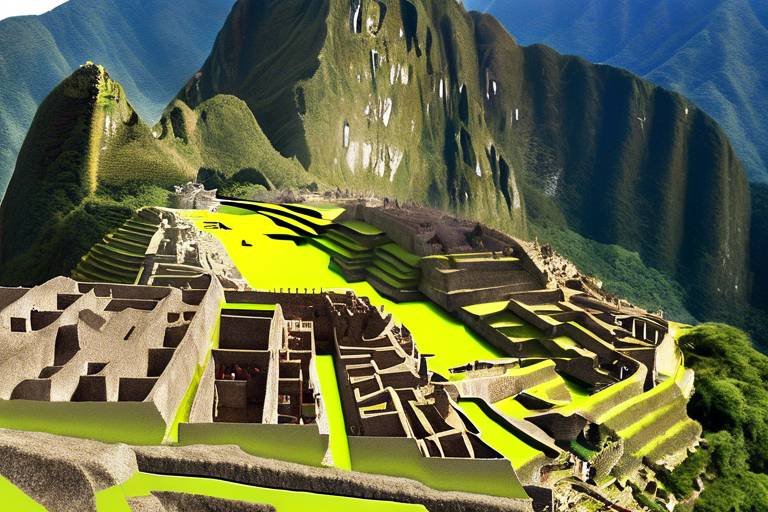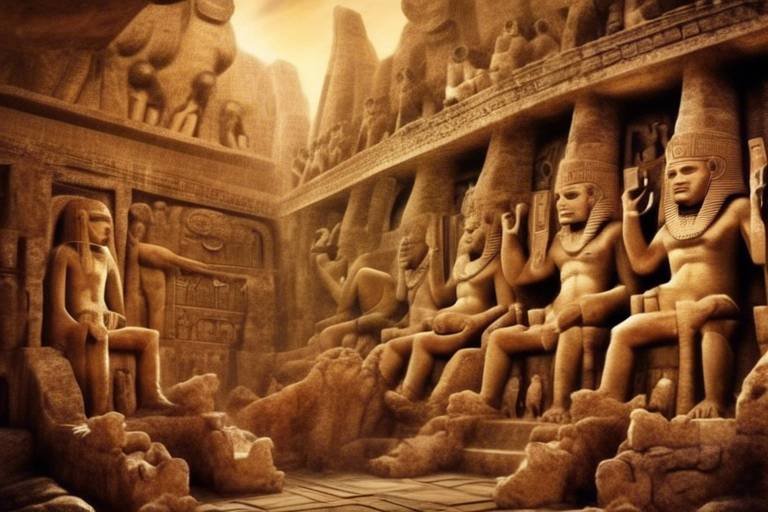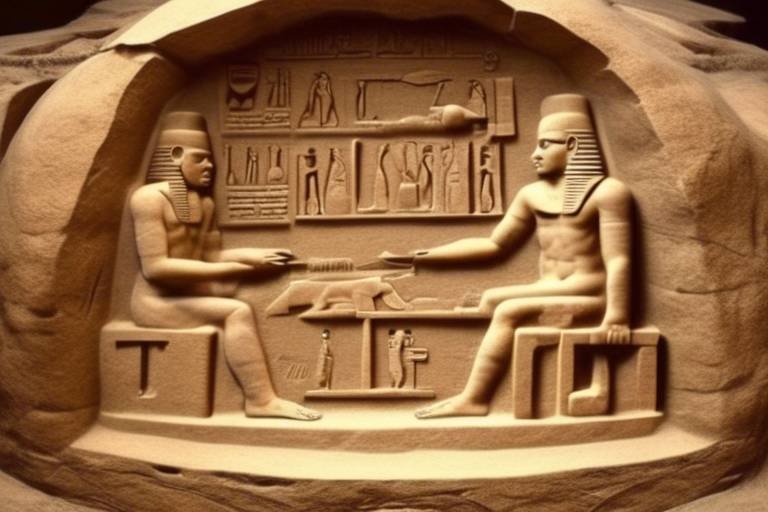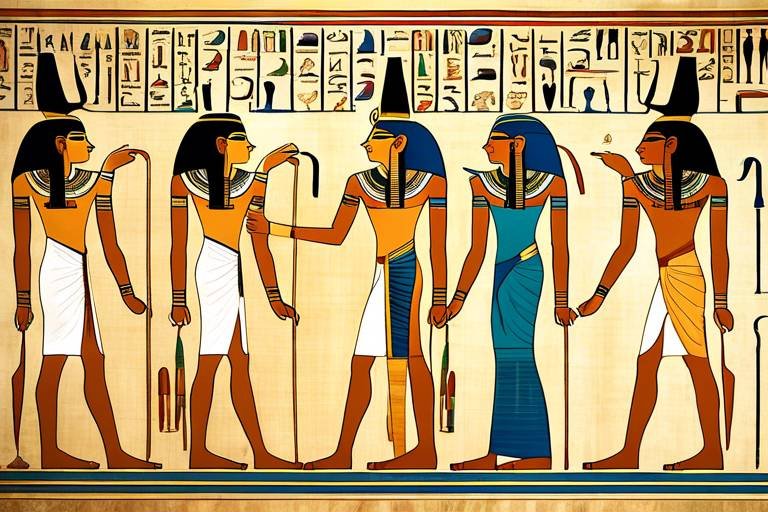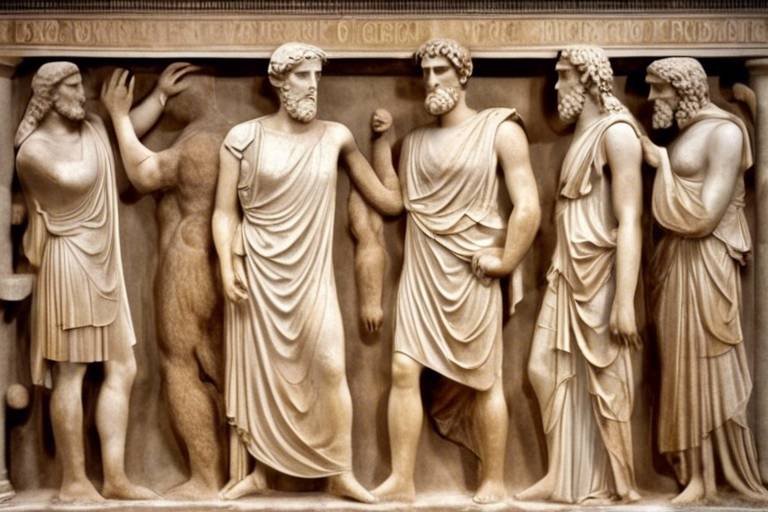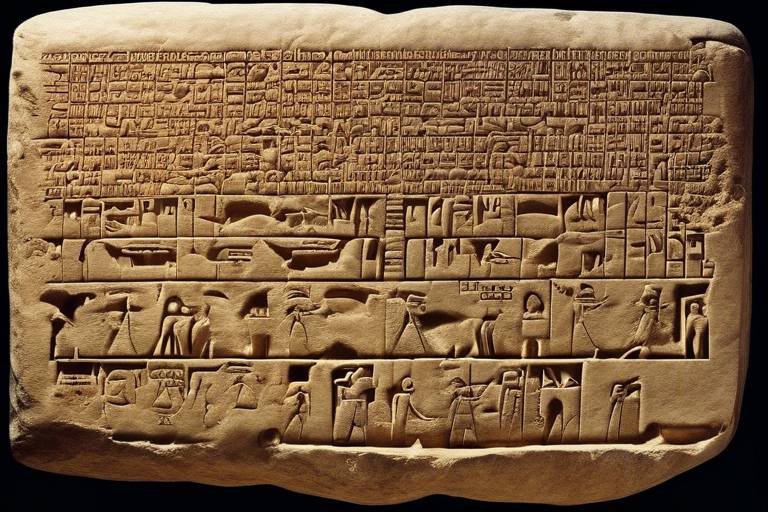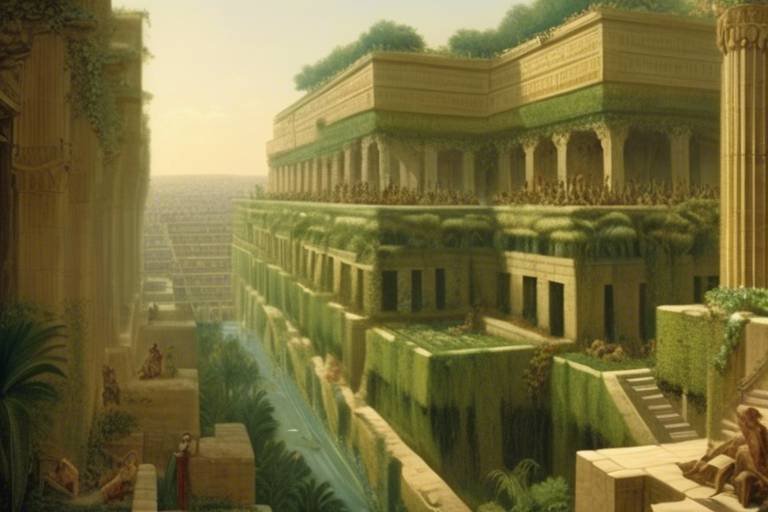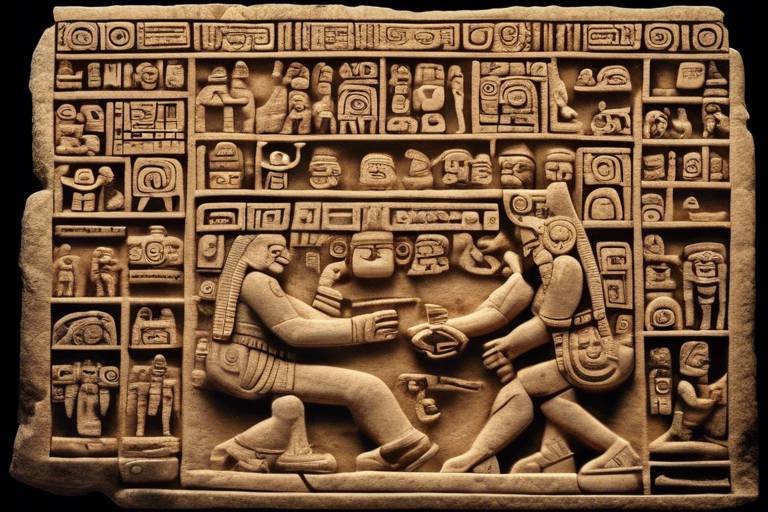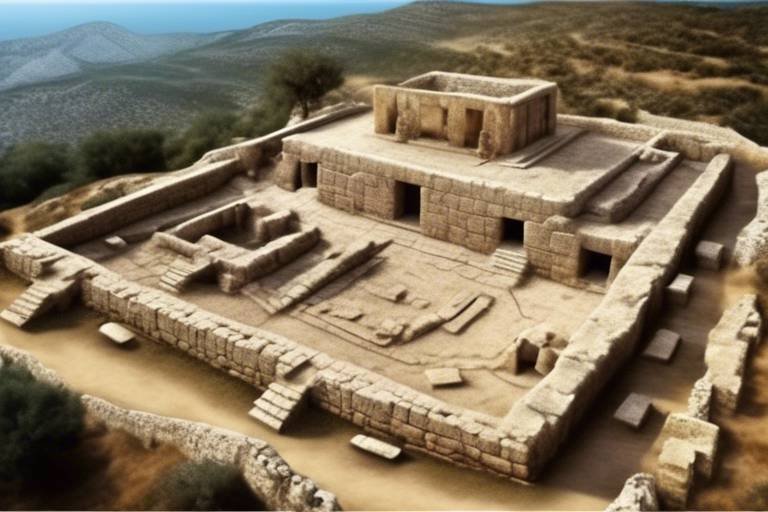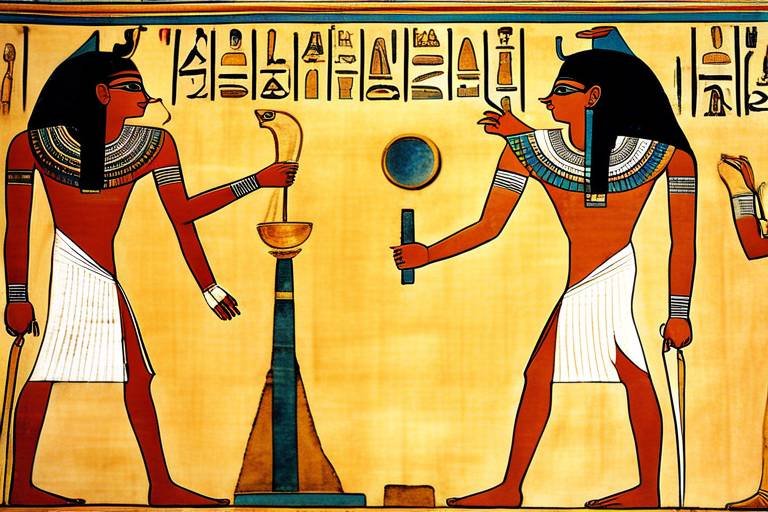The Mystery of the Ancient Chinese Dynasties' Influence on Science
Delve into the enigmatic realm of ancient Chinese dynasties and their profound influence on the realm of science. The mysteries surrounding the scientific advancements made during these dynasties continue to captivate modern minds and shed light on the remarkable achievements of early Chinese scholars and innovators. From technological marvels to astronomical insights, medical practices, and philosophical foundations, the legacy of ancient Chinese science reverberates through the annals of history.

Technological Innovations
When we delve into the history of ancient Chinese dynasties, one cannot overlook the remarkable that emerged during those times. These advancements were not just inventions; they were groundbreaking creations that revolutionized the course of human history.
One of the most significant contributions of ancient Chinese dynasties was the invention of papermaking, a pivotal development that transformed the way information was recorded and disseminated. The creation of paper enabled the spread of knowledge and ideas on a scale never seen before, laying the foundation for the proliferation of literature and education.
Another monumental invention was printing, which allowed for the mass production of texts and images. This innovation democratized access to information and played a crucial role in the dissemination of knowledge across vast territories, fostering cultural exchange and intellectual growth.
The discovery of gunpowder by ancient Chinese alchemists marked a turning point in military technology and warfare. The invention of gunpowder not only revolutionized combat strategies but also had far-reaching implications for the development of fireworks, signaling a fusion of science and art that captivated audiences worldwide.
The invention of the compass by ancient Chinese navigators revolutionized maritime exploration and trade. By harnessing the power of magnetism, the compass provided sailors with a reliable means of navigation, enabling them to traverse vast oceans with confidence and precision.
Furthermore, ancient Chinese dynasties were known for their engineering marvels that showcased their ingenuity and mastery of technical skills. From the construction of intricate water clocks to the development of mechanical puppet theaters, these technological innovations reflected the creativity and craftsmanship of ancient Chinese artisans and engineers.
In conclusion, the technological innovations of ancient Chinese dynasties not only shaped the course of history but also laid the groundwork for modern advancements in science, technology, and engineering. Their legacy continues to inspire and awe us, reminding us of the enduring impact of ancient wisdom and ingenuity.

Astronomical Observations
Astronomical observations during the ancient Chinese dynasties were not only remarkable but also profoundly influential in shaping the course of scientific knowledge. The meticulous records kept by Chinese astronomers, their precise celestial observations, and the development of sophisticated astronomical instruments demonstrated a deep understanding of the cosmos.
One of the most significant contributions of ancient Chinese astronomers was the creation of calendars based on astronomical observations. By studying the movements of the sun, moon, and stars, they developed calendars that not only regulated agricultural activities but also played a crucial role in governance and religious ceremonies.
The Chinese also made groundbreaking discoveries in the field of comets and supernovae, recording these celestial events with precision. Their observations of eclipses, planetary movements, and the positions of stars laid the foundation for future astronomical studies and contributed to a global understanding of the universe.
Moreover, the Chinese astronomers' emphasis on the cyclical nature of celestial phenomena influenced the development of cosmological theories and the concept of cosmic harmony. Their belief in the interconnectedness of the heavens and the earth inspired a holistic approach to studying the universe, integrating astronomical observations with philosophical and spiritual insights.
Through their astronomical observations, ancient Chinese astronomers not only advanced scientific knowledge but also fostered a profound appreciation for the wonders of the cosmos. Their legacy continues to inspire astronomers and scientists worldwide, reminding us of the enduring legacy of Chinese scientific achievements in the field of astronomy.

Medical Practices
When delving into the realm of ancient Chinese medical practices, one cannot help but marvel at the intricate web of knowledge and wisdom that has stood the test of time. The traditional Chinese approach to medicine is deeply rooted in the concept of balance and harmony within the body, where the interconnectedness of mind, body, and spirit is central to the healing process. Herbal remedies play a significant role in Chinese medicine, with a vast array of plants and natural substances utilized for their therapeutic properties.
Acupuncture, a practice that involves the insertion of thin needles into specific points on the body to stimulate energy flow, is a hallmark of traditional Chinese medicine. This ancient technique is based on the belief that the body's vital energy, or qi, flows along pathways known as meridians, and disruptions in this flow can lead to illness. By restoring the balance of qi through acupuncture, practitioners aim to promote healing and alleviate various health conditions.
The ancient Chinese had a profound understanding of the human body, long before the advent of modern medical science. Concepts such as the circulation of blood, the importance of maintaining a healthy diet, and the significance of exercise for overall well-being were integral to their medical practices. By observing nature and drawing parallels between natural phenomena and human physiology, ancient Chinese physicians developed a holistic approach to health that continues to inspire modern medical practitioners.
Furthermore, the practice of traditional Chinese medicine extends beyond treating physical ailments to encompass mental and emotional well-being. The concept of yin and yang, representing opposing forces that must be balanced for optimal health, is central to Chinese medical philosophy. By addressing not only the symptoms but also the underlying imbalances in the body, traditional Chinese medicine seeks to restore harmony and promote longevity.

Scientific Philosophy
Chinese civilization has a rich history of scientific achievements that have left an indelible mark on the world. In this article, we will delve into the fascinating world of ancient Chinese dynasties and their profound influence on science, technology, medicine, and philosophy. Let's embark on a journey through time to uncover the mysteries of Chinese scientific discoveries and their enduring legacy.
Ancient Chinese scientific thought was deeply rooted in philosophical principles that emphasized harmony with nature and the interconnectedness of all things. Central to this philosophy were the concepts of yin and yang, representing the dualistic nature of the universe, and the five elements theory, which categorized natural phenomena into wood, fire, earth, metal, and water.
This holistic approach to understanding the world guided Chinese scientists in their exploration of the natural world and the cosmos. By observing the patterns of nature and the movements of celestial bodies, ancient Chinese scholars sought to unravel the mysteries of the universe and uncover the underlying principles that governed all existence.
Furthermore, the concept of harmony with nature was central to Chinese scientific endeavors, with a focus on maintaining a balance between humanity and the natural world. This ecological perspective influenced various fields of study, from agriculture to medicine, emphasizing the importance of sustainable practices and respect for the environment.
Chinese scientific philosophy also highlighted the interconnectedness of the universe, viewing all phenomena as interconnected and interdependent. This holistic worldview fostered a deep appreciation for the unity of all things and the intricate relationships that governed the cosmos.
Through their philosophical insights and scientific pursuits, ancient Chinese scholars laid the foundation for a holistic approach to understanding the world that continues to inspire researchers and thinkers to this day. The legacy of Chinese scientific philosophy endures as a testament to the enduring wisdom of the ancient dynasties and their profound contributions to the advancement of human knowledge.
If you have any questions or queries about the ancient Chinese dynasties' influence on science, check out our FAQ section below:
- Q: What were some key technological innovations of ancient Chinese dynasties?
- A: Ancient Chinese dynasties were known for their groundbreaking inventions such as papermaking, printing, gunpowder, compass, and advanced engineering marvels.
- Q: How did ancient Chinese astronomers contribute to the field of astronomy?
- A: Chinese astronomers made significant celestial discoveries, developed calendars, and influenced global astronomical knowledge.
- Q: What is the significance of Chinese botanical knowledge?
- A: Ancient Chinese civilizations had advanced botanical knowledge that impacted global agriculture and pharmacology through plant classification systems and herbal medicine.

Innovative Engineering
Topics to be discussed in the article include the scientific advancements during ancient Chinese dynasties, their impact on modern science, technological innovations, astronomical observations, medical practices, and the enduring legacy of Chinese scientific achievements.
When we delve into the innovative engineering marvels of the ancient Chinese dynasties, we are transported to a world where ingenuity and craftsmanship knew no bounds. The construction of monumental structures like the Great Wall stands as a testament to their engineering prowess, showcasing not only their ability to envision grand projects but also to execute them with precision and skill.
The intricate systems of advanced irrigation developed by the ancient Chinese civilizations revolutionized agricultural practices, allowing for efficient water management and increased crop yields. These engineering feats were not only practical solutions to everyday challenges but also reflections of a society that valued sustainable development and harmonious coexistence with nature.
One cannot overlook the architectural achievements of ancient Chinese dynasties, with intricate temples, palaces, and pagodas that blended artistry with functionality. The meticulous planning and attention to detail in their construction highlight the mastery of architectural principles and the cultural significance imbued in every structure.
Moreover, the engineering ingenuity displayed in projects like the Grand Canal, a monumental waterway connecting different regions of China, showcased their ability to overcome geographical obstacles and facilitate trade and communication. The sheer scale and complexity of such undertakings underscore the advanced engineering knowledge possessed by ancient Chinese civilizations.
Through their innovative engineering endeavors, the ancient Chinese dynasties not only shaped the physical landscape but also laid the foundation for future technological advancements. Their legacy continues to inspire awe and admiration, serving as a reminder of the remarkable achievements born out of human creativity and determination.
Stay tuned for answers to commonly asked questions about the influence of ancient Chinese dynasties on science, covering topics such as technological innovations, astronomical observations, medical practices, scientific philosophy, mathematical contributions, botanical knowledge, and the enduring legacy of Chinese science.

Mathematical Contributions
Ancient Chinese mathematicians made significant contributions to the field of mathematics, leaving a lasting impact on the development of mathematical knowledge. Their advancements in arithmetic, geometry, algebra, and mathematical concepts have influenced modern mathematics in profound ways. One of the notable contributions of ancient Chinese mathematicians is the development of the decimal system, which laid the foundation for numerical calculations and mathematical operations.
Moreover, ancient Chinese mathematicians excelled in the study of geometry, particularly in the calculation of areas and volumes of various shapes. Their geometric principles and formulas were instrumental in architectural design, engineering projects, and land surveying. Additionally, Chinese mathematicians made significant progress in algebra, solving complex equations and developing algebraic methods that are still used today.
The concept of zero, a fundamental element in mathematics, was also pioneered by ancient Chinese mathematicians. The invention of the abacus, a calculating tool that revolutionized mathematical computations, is attributed to the innovative thinking of ancient Chinese scholars. This early form of a calculator played a crucial role in trade, commerce, and scientific calculations.
Ancient Chinese mathematicians were also adept at solving practical mathematical problems related to agriculture, astronomy, and commerce. Their mathematical prowess extended to the development of mathematical models for predicting celestial events, designing irrigation systems, and managing financial transactions. The mathematical legacy of ancient Chinese scholars continues to inspire contemporary mathematicians and researchers worldwide.

Botanical Knowledge
When exploring the botanical knowledge of ancient Chinese civilizations, one cannot overlook the profound impact it had on global agriculture and pharmacology. The meticulous cultivation of crops, utilization of herbal medicine, and development of sophisticated plant classification systems demonstrated the advanced understanding of botanical science in ancient China. Chinese botanical discoveries not only enriched their own agricultural practices but also influenced botanical studies worldwide.
A key aspect of ancient Chinese botanical knowledge was the integration of plants into traditional medicine. The use of herbal remedies and plant-based treatments was deeply rooted in Chinese culture, with a focus on harnessing the healing properties of various plants to promote holistic health and well-being. This early recognition of the therapeutic potential of plants laid the groundwork for the development of modern pharmacology and the utilization of natural remedies in contemporary medicine.
Moreover, ancient Chinese civilizations were pioneers in agricultural innovation, implementing advanced farming techniques and crop cultivation methods that significantly increased agricultural productivity. The introduction of new crop varieties, irrigation systems, and agricultural tools not only sustained the growing population but also contributed to the overall advancement of agricultural practices globally.
Chinese botanical knowledge was not limited to practical applications but also extended to the scientific classification of plants. The meticulous categorization and documentation of various plant species showcased the Chinese commitment to systematic botanical studies. This emphasis on botanical classification not only facilitated agricultural practices but also laid the foundation for botanical taxonomy and the study of plant diversity.
The enduring legacy of Chinese botanical knowledge is evident in the continued exploration of traditional Chinese medicine and the integration of herbal remedies into modern healthcare practices. By preserving and building upon the botanical wisdom of ancient Chinese civilizations, contemporary researchers are able to unlock the potential of plant-based medicine and further expand our understanding of the intricate relationship between plants and human health.

Legacy of Chinese Science
The legacy of Chinese science is a tapestry woven with threads of innovation, wisdom, and timeless knowledge that continues to shape the landscape of modern scientific inquiry. The ancient Chinese dynasties left an indelible mark on the annals of history, with their pioneering advancements in various scientific disciplines reverberating through the corridors of time.
One of the most remarkable aspects of the legacy of Chinese science is its profound influence on contemporary scientific practices. From the meticulous astronomical observations of ancient Chinese astronomers to the intricate mathematical contributions of early Chinese mathematicians, the foundations laid by these early scholars continue to underpin our understanding of the natural world.
Moreover, the holistic approach to medical practices and herbal remedies developed by ancient Chinese civilizations has not only endured but has also found renewed relevance in the modern era. The principles of traditional Chinese medicine, including acupuncture techniques and herbal remedies, offer a unique perspective on health and well-being that complements conventional medical practices.
Furthermore, the engineering marvels constructed by ancient Chinese dynasties stand as testaments to their ingenuity and mastery of architectural principles. The Great Wall, the Grand Canal, and sophisticated irrigation systems are not only engineering feats but also symbols of the enduring legacy of Chinese engineering prowess.
Additionally, the botanical knowledge and agricultural practices of ancient Chinese civilizations have had a lasting impact on global agriculture and pharmacology. The cultivation of crops, development of herbal medicine, and sophisticated plant classification systems pioneered by early Chinese botanists continue to shape agricultural practices and pharmaceutical research worldwide.
In essence, the legacy of Chinese science is a treasure trove of wisdom and innovation that continues to inspire and inform scientific inquiry across the globe. By delving into the rich tapestry of ancient Chinese scientific achievements, we not only gain a deeper appreciation for the ingenuity of our predecessors but also uncover valuable insights that can guide us in our quest for knowledge and discovery.
Frequently Asked Questions
- What were some of the key technological innovations during ancient Chinese dynasties?
Ancient Chinese dynasties made significant technological advancements, including the invention of papermaking, printing techniques, gunpowder, the compass, and various engineering marvels that shaped the course of history.
- How did ancient Chinese astronomers contribute to the field of astronomy?
Ancient Chinese astronomers made notable contributions through their astronomical observations, celestial discoveries, development of calendars, and the influence of their findings on global astronomy practices.
- What were some traditional Chinese medical practices that influenced modern medicine?
Ancient Chinese medical practices, such as herbal remedies, acupuncture techniques, and holistic health approaches, laid the foundation for modern medical science and continue to impact healthcare practices today.
- What philosophical concepts influenced ancient Chinese scientific thought?
Ancient Chinese scientific thought was shaped by philosophical concepts like yin and yang, the five elements, harmony with nature, and the interconnectedness of the universe, reflecting in their scientific pursuits and discoveries.
- What were some notable engineering feats of ancient Chinese dynasties?
Ancient Chinese dynasties showcased remarkable engineering achievements, including the construction of the Great Wall, the Grand Canal, advanced irrigation systems, and architectural marvels that demonstrated their mastery of engineering principles.
- How did ancient Chinese mathematicians contribute to the field of mathematics?
Ancient Chinese mathematicians made significant contributions in arithmetic, geometry, algebra, and the development of mathematical concepts that continue to influence modern mathematics and scientific disciplines.
- What botanical knowledge and practices were prevalent in ancient Chinese civilizations?
Ancient Chinese civilizations had advanced botanical knowledge, including crop cultivation, herbal medicine, plant classification systems, and discoveries that influenced global agriculture and pharmacology.
- What is the lasting legacy of ancient Chinese scientific achievements?
The enduring legacy of ancient Chinese scientific achievements continues to impact contemporary scientific disciplines, traditional knowledge preservation, and ongoing research to uncover the mysteries of their contributions to science.


